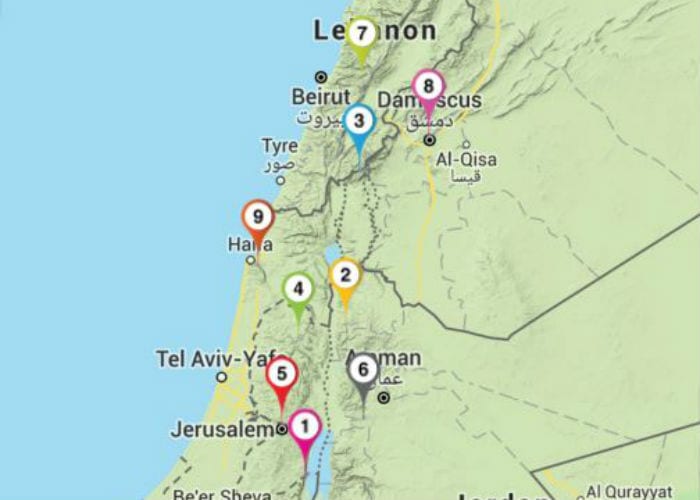
TORAH
NEVI'IM
KETUVIM
Chapter 6
Translation and Transliteration of
Listen to this chapter in Hebrew:
- Commentary
- Buy E-book
- Buy the Israel Bible
1“Whither has your beloved gone, O fairest of women? Whither has your beloved turned? Let us seek him with you.”
אאָנָה הָלַךְ דּוֹדֵךְ הַיָּפָה בַּנָּשִׁים אָנָה פָּנָה דוֹדֵךְ וּנְבַקְשֶׁנּוּ עִמָּךְ׃
2My beloved has gone down to his garden, To the beds of spices, To browse in the gardens And to pick lilies.
בדּוֹדִי יָרַד לְגַנּוֹ לַעֲרוּגוֹת הַבֹּשֶׂם לִרְעוֹת בַּגַּנִּים וְלִלְקֹט שׁוֹשַׁנִּים׃
3I am my beloved's And my beloved is mine; He browses among the lilies.
גאֲנִי לְדוֹדִי וְדוֹדִי לִי הָרֹעֶה בַּשׁוֹשַׁנִּים׃
4You are beautiful, my darling, as Tirtza, Comely as Yerushalayim, Awesome as bannered hosts.
ya-FAH AT ra-ya-TEE k'-tir-TZAH na-VAH kee-ru-sha-LA-im a-yu-MAH ka-nid-ga-LOT
דיָפָה אַתְּ רַעְיָתִי כְּתִרְצָה נָאוָה כִּירוּשָׁלָ ִם אֲיֻמָּה כַּנִּדְגָּלוֹת׃
![]() 6:4 You are beautiful, my darling, as Tirtza, comely as Yerushalayim
6:4 You are beautiful, my darling, as Tirtza, comely as Yerushalayim
Tirtza was an important city of the northern kingdom of Yisrael, which served as its capital during the reigns of the kings Baasha, Elah, Zimri and Omri (see I Kings 14:17). Yerushalayim, of course, was the capital of the kingdom of Yehuda. On a simple level, the lover says that his beloved is as beautiful as these capitals; that she is like a queen befitting the royal cities. On a deeper level, Rabbi Amos Hakham notes that the name Tirza (תרצה) is related to the word ratza (רצה), ‘desire,’ and the name Yerushalayim (ירושלים) is derived from the word shalem (שלם), meaning ‘complete.’ Hence, this verse also alludes to the fact that Hashem finds His people both ‘desirable’ and ‘complete’.
5Turn your eyes away from me, For they overwhelm me! Your hair is like a flock of goats Streaming down from Gilad.
ההָסֵבִּי עֵינַיִךְ מִנֶּגְדִּי שֶׁהֵם הִרְהִיבֻנִי שַׂעְרֵךְ כְּעֵדֶר הָעִזִּים שֶׁגָּלְשׁוּ מִן־הַגִּלְעָד׃
6Your teeth are like a flock of ewes Climbing up from the washing pool; All of them bear twins, And not one loses her young.
ושִׁנַּיִךְ כְּעֵדֶר הָרְחֵלִים שֶׁעָלוּ מִן־הָרַחְצָה שֶׁכֻּלָּם מַתְאִימוֹת וְשַׁכֻּלָה אֵין בָּהֶם׃
7Your brow behind your veil [Gleams] like a pomegranate split open.
זכְּפֶלַח הָרִמּוֹן רַקָּתֵךְ מִבַּעַד לְצַמָּתֵךְ׃
8There are sixty queens, And eighty concubines, And damsels without number.
חשִׁשִּׁים הֵמָּה מְּלָכוֹת וּשְׁמֹנִים פִּילַגְשִׁים וַעֲלָמוֹת אֵין מִסְפָּר׃
9Only one is my dove, My perfect one, The only one of her mother, The delight of her who bore her. Maidens see and acclaim her; Queens and concubines, and praise her.
טאַחַת הִיא יוֹנָתִי תַמָּתִי אַחַת הִיא לְאִמָּהּ בָּרָה הִיא לְיוֹלַדְתָּהּ רָאוּהָ בָנוֹת וַיְאַשְּׁרוּהָ מְלָכוֹת וּפִילַגְשִׁים וַיְהַלְלוּהָ׃
10Who is she that shines through like the dawn, Beautiful as the moon, Radiant as the sun Awesome as bannered hosts?
ימִי־זֹאת הַנִּשְׁקָפָה כְּמוֹ־שָׁחַר יָפָה כַלְּבָנָה בָּרָה כַּחַמָּה אֲיֻמָּה כַּנִּדְגָּלוֹת׃
11I went down to the nut grove To see the budding of the vale; To see if the vines had blossomed, If the pomegranates were in bloom.
יאאֶל־גִּנַּת אֱגוֹז יָרַדְתִּי לִרְאוֹת בְּאִבֵּי הַנָּחַל לִרְאוֹת הֲפָרְחָה הַגֶּפֶן הֵנֵצוּ הָרִמֹּנִים׃
12Before I knew it, My desire set me Mid the chariots of Ammi-nadib.
יבלֹא יָדַעְתִּי נַפְשִׁי שָׂמַתְנִי מַרְכְּבוֹת עַמִּי־נָדִיב׃







